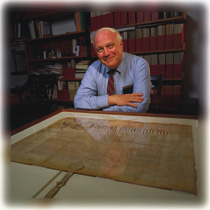![]()
Main Menu ·
Search ·
Current Issue · Contact · Archives · Centennial · Letters to the Editor · FAQs
![]()
Main Menu ·
Search ·
Current Issue · Contact · Archives · Centennial · Letters to the Editor · FAQs

Harley P. Holden
|
The curator of the Harvard University Archives, Harley Holden, is in charge of the official records of the University, among them (left) the 1650 charter that established the President and Fellows of Harvard College, the oldest corporation in the Western Hemisphere. He also squirrels away doctoral theses, the professional and personal papers of faculty members, fiction related to Harvard, biographical matter on graduates, and diverse items of Harvardiana, such as the crystal bowl given by Prince Charles in 1986, President Dunster's baby shirt, the silver keys to the College, and Archibald Cox's (unused) jock strap. Holden grew up in Shirley Center, Massachusetts, across the common from Clifford Shipton '26, Ph.D. '33, Litt.D. '64, who was the Harvard archivist of that time. Shipton spotted a successor in the young Holden, curious about his family's records, and offered him a job, to which he came straight after undergraduate work at Boston University in 1960. Holden still lives in Shirley Center, on ancestral lands where he and a brother have planted 28,000 daffodils, 6,000 tulips, and many trees of dubious hardiness (Holden's specialty). He has a love of place, and hasn't left Shirley Center for more than three weeks in his life. He has the gentle compulsiveness of the collector, even in travel. He has followed every road on the state map of Vermont, for instance, 80 percent of those in Massachusetts and New Hampshire, and has only 15 miles to go in Maine. Those miles are on islands, which is awkward. "The point isn't just to go down the road," he says. "The point is what you see and its interest--geologically, botanically, historically."
Main Menu ·
Search · Current Issue · Contact · Archives · Centennial · Letters to the Editor · FAQs
![]()